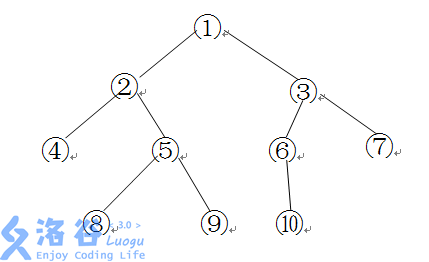1
2
3
4
5
6
7
8
9
10
11
12
13
14
15
16
17
18
19
20
21
22
23
24
25
26
27
28
29
30
31
32
33
34
35
36
37
38
39
40
41
42
43
44
45
46
47
48
49
50
51
52
53
54
55
56
57
58
59
60
61
62
63
64
65
66
67
68
69
70
71
72
73
74
75
76
77
78
79
80
81
82
83
84
85
86
87
88
89
90
91
92
93
94
95
| #include <iostream>
#include <cstdio>
#include <cstring>
#include <cctype>
using namespace std;
const int MAXN = 100 + 10;
struct Edge {
int prev, next;
} edge[MAXN * 2];
int head[MAXN], father[MAXN][22], lg[MAXN], depth[MAXN];
int cnt, n, m, s;
int KangShifu[MAXN];
inline int getint() {
int s = 0, x = 1;
char ch = getchar();
while (!isdigit(ch)) {
if (ch == '-') x = -1;
ch = getchar();
}
while (isdigit(ch)) {
s = s * 10 + ch - '0';
ch = getchar();
}
return s * x;
}
inline void putint(int x, bool returnValue) {
if (x < 0) {
x = -x;
putchar('-');
}
if (x >= 10) putint(x / 10, false);
putchar(x % 10 + '0');
if (returnValue) putchar('\n');
}
inline void addEdge(int prev, int next) {
edge[++cnt].prev = prev;
edge[cnt].next = head[next];
head[next] = cnt;
}
void dfsInit(int root, int fa) {
depth[root] = depth[fa] + 1;
father[root][0] = fa;
for (int i = 1; (1 << i) <= depth[root]; ++i) {
father[root][i] = father[father[root][i-1]][i-1];
}
for (int e = head[root]; e; e = edge[e].next) {
if (edge[e].prev != fa) dfsInit(edge[e].prev, root);
}
}
int LCA(int x, int y) {
if (depth[x] < depth[y]) swap(x, y);
while (depth[x] > depth[y])
x = father[x][lg[depth[x] - depth[y]] - 1];
if (x == y) return x;
for (int i = lg[depth[x]]; i >= 0; --i) {
if (father[x][i] != father[y][i]) x = father[x][i], y = father[y][i];
}
return father[x][0];
}
int main(int argc, char *const argv[]) {
n = getint();
for (int i = 1; i < n; ++i) {
int prev = getint(), next = getint();
addEdge(prev, next);
addEdge(next, prev);
}
int u = getint();
int v = getint();
dfsInit(1, 0);
for (int i = 1; i <= n; ++i) {
lg[i] = lg[i-1] + (1 << lg[i-1] == i);
}
int lca = LCA(u, v);
int Depth = -23333;
for (int i = 1; i <= n; ++i) {
Depth = std::max(Depth, depth[i]);
++KangShifu[depth[i]];
}
int width = -23333;
for (int i = 1; i <= Depth + 2; ++i) width = std::max(width, KangShifu[i]);
putint(Depth, true);
putint(width, true);
putint((depth[u] - depth[lca]) * 2 + (depth[v] - depth[lca]), true);
return 0;
}
|

